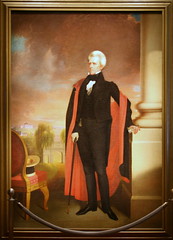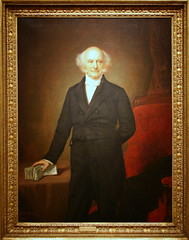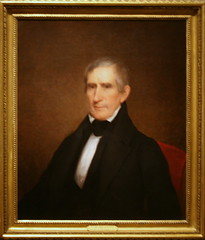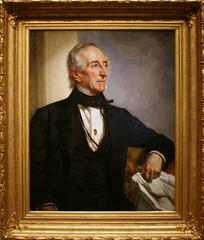US History Chapters 11-12 Jackson Age/Manifest Destiny.
| the right to vote | ||
| practice of handing out government jobs to supporters; replacing government employees with the winning candidate's supporters. | ||
| a tax on imports or exports | ||
| to cancel or make ineffective | ||
| to leave or withdraw | ||
| to force a person or group of people to move | ||
| referring to surprise attacks or raids rather than organized warfare | ||
| to reject a bill and prevent it from becoming a law | ||
| policy that government should interfere as little as possible in the nation's economy | ||
| name given to William Henry Harrison's campaign for the presidency in 1840, from the Whigs' use of a log cabin as their symbol | ||
| the possession and settling of an area shared by two or more countries | ||
| a person who leaves a country or region to live elsewhere | ||
| Notion that America was destined by God to stretch from Atlantic to Pacific. Drew upon Thomas Jefferson's vision of an expansive "empire of liberty". Used as a rationale for expansionist foreign policy | ||
| Large covered wagons used on the Oregon Trail | ||
| A statement of foreign policy which proclaimed that Europe should not interfere in affairs within the United States or in the development of other countries in the Western Hemisphere. | ||
| John C. Calhoun declared states had a right to nullify. South Carolina declared Nullification Act, stating both tariffs were unconstitutional and therefore illegal. | ||
| Authorized the president to pursue ownership of all Indian land east of the Mississippi River. Said Indians would be compensated with new land west of the Mississippi River | ||
| Cherokees were force marched westward to present-day Oklahoma. The path they followed would later be named the Trail of Tears | ||
| U.S. purchased Florida but gave up claims to Texas. Giving up Texas made many southerners angry at Secretary of State John Q. Adams | ||
| an almost 2,000 mile-long trial leading from Missouri to Oregon; stretched over wild country and hazardous mountains | ||
| General Zachary Taylor led Americans to Rio Grande, in disputed territory on Mexico-Texas border. Skirmish between Mexican and American troops led to full-blown war. U.S. forces led by Winfield Scott landed at Veracruz, marched inland to capture Mexican capital. Forced Mexicans to accept peace treaty that ceded American Southwest to U.S. | ||
| Officially ended Mexican-American War. U.S. annexed California, Arizona, New Mexico, other areas in Southwest. Mexico lost 55% of its territory | ||
| Strip of land in present-day Arizona and New Mexico that was acquired by the U.S. in 1853 for $10 million. | ||
| Elected 7th president of the U.S., 1828. Served in the American Revolution, the Creek War of 1813-14, and was a major general in the War of 1812. Remembered as a great hero for leading American forces to victory in the Battle of New Orleans during the final days of the War of 1812. As president, organized relocation of some 90,000 Indians from the East to territories west of the Mississippi River. Strengthened the Union by rejecting South Carolina's attempt to nullify federal laws. Destroyed the Bank of the United States |  | |
| United States politician and orator (1782-1817), Leader of the Whig Party, originally pro-North, supported the Compromise of 1850 and subsequently lost favor from his constituency |  | |
| United States general who was a hero of the War of 1812 and who defeated Santa Anna in the Mexican War (1786-1866) |  | |
| The leader of the Illinois tribes of Indians in the 1830's. When the Indians were uprooted, and forced out of their homes, he led the Indians in resisting the move. However, he wasn't powerful enough, because in 1832 they were brutally defeated, and forced to move into Oklahoma. |  | |
| Led a band of Seminoles that hid in the Everglades and used guerrilla tactics to defeat the U.S Army., Seminole leader who resisted the removal of his people from Florida in the 1830s. |  | |
| American senator and statesman, leader of Whig Party. Commonly referred to as the "Great Compromiser". Shaped Missouri Compromise and Compromise of 1850. Opposed annexation of Texas at first, then compromised position for political reasons |  | |
| President Andrew Jackson's Secretary of State from 1829 to 1831. As Secretary of State, was President Jackson's most trusted and loyal adviser. Vice president from 1833 to 1837. With Jackson's support, became 8th president of the U.S., 1837. |  | |
| American political party, founded to oppose Jacksonian Democrats in 1830s. Believed in economic improvement and domination of legislative branch. Torn apart by questions over expansion of slavery | ||
| 9th president. Hero of the Battle of Tippecanoe. Nominated as the Whig's presidential candidate for 1840. Proven vote getter. Military hero who expressed few opinions on national issues and had not political record to defend. |  | |
| elected Vice President and became the 10th President of the United States when Harrison died 1841-1845, President responsible for annexation of Mexico after receiving mandate from Polk, opposed many parts of the Whig program for economic recovery |  | |
| Democratic president of the United States, 1845-49. Oversaw Mexican-American War and largest expansion of U.S. territory since Louisiana Purchase |  |

